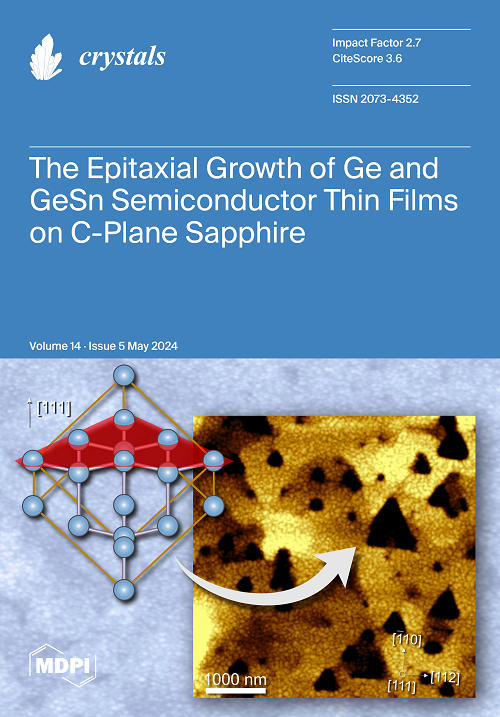Defect Passivation for Highly Efficient and Stable Sn-Pb Perovskite Solar Cells
IF 2.4
4区 材料科学
Q2 CRYSTALLOGRAPHY
引用次数: 0
Abstract
Sn-Pb perovskite solar cells, which have the advantages of low toxicity and a simple preparation process, have witnessed rapid development in recent years, with the power conversion efficiency for single-junction solar cells exceeding 23%. Nevertheless, the problems of poor crystalline quality of Sn-Pb perovskite films arising from rapid crystallization rate and facile oxidation of Sn2+ to Sn4+ have become key issues for the further development of Sn-Pb perovskite solar cells. Herein, we report the incorporation of triazinamide (N-(6-methyl-3-oxo-2,5-dihydro-1,2,4-Triazin-4(3H)-YL) acetamide) as an additive to regulate the crystalline growth of Sn-Pb perovskite films, resulting in films with low trap density and large grain size. The triazinamide additive effectively passivated defects in the perovskite films. As a result, the triazinamide-modified perovskite solar cells achieved a higher efficiency of 15.73%, compared with 13.32% for the control device, significantly improving device performance. Notably, the optimal triazinamide-modified perovskite solar cell maintained 72% of its initial power conversion efficiency after being stored in an air environment for nearly 300 h, while only 18% of the power conversion efficiency of the control perovskite solar cell was retained. This study proposes an effective strategy for fabricating highly efficient and stable Sn-Pb perovskite solar cells.钝化缺陷以实现高效稳定的锡铅包晶太阳能电池
锡铅共晶体太阳能电池具有毒性低、制备工艺简单等优点,近年来发展迅速,单结太阳能电池的功率转换效率已超过 23%。然而,由于结晶速度快、Sn2+容易氧化成Sn4+等原因导致的Sn-Pb包晶体薄膜结晶质量差等问题已成为Sn-Pb包晶体太阳能电池进一步发展的关键问题。在此,我们报告了加入三嗪酰胺(N-(6-甲基-3-氧代-2,5-二氢-1,2,4-三嗪-4(3H)-YL)乙酰胺)作为添加剂来调节 Sn-Pb 包晶石薄膜的结晶生长,从而获得低陷阱密度和大晶粒尺寸的薄膜。三嗪酰胺添加剂有效地钝化了透辉石薄膜中的缺陷。因此,三嗪酰胺改性过氧化物太阳能电池的效率提高到 15.73%,而对照器件的效率仅为 13.32%,显著改善了器件性能。值得注意的是,最佳的三嗪酰胺改性过氧化物太阳能电池在空气环境中存放近 300 小时后,其功率转换效率仍保持在初始值的 72%,而对照过氧化物太阳能电池的功率转换效率仅保持在 18%。这项研究为制造高效、稳定的锡铅包晶太阳能电池提出了一种有效的策略。
本文章由计算机程序翻译,如有差异,请以英文原文为准。
求助全文
约1分钟内获得全文
求助全文
来源期刊

Crystals
CRYSTALLOGRAPHYMATERIALS SCIENCE, MULTIDIS-MATERIALS SCIENCE, MULTIDISCIPLINARY
CiteScore
4.20
自引率
11.10%
发文量
1527
审稿时长
16.12 days
期刊介绍:
Crystals (ISSN 2073-4352) is an open access journal that covers all aspects of crystalline material research. Crystals can act as a reference, and as a publication resource, to the community. It publishes reviews, regular research articles, and short communications. Our aim is to encourage scientists to publish their experimental and theoretical results in as much detail as possible. Therefore, there is no restriction on article length. Full experimental details must be provided to enable the results to be reproduced. Crystals provides a forum for the advancement of our understanding of the nucleation, growth, processing, and characterization of crystalline materials. Their mechanical, chemical, electronic, magnetic, and optical properties, and their diverse applications, are all considered to be of importance.
文献相关原料
公司名称
产品信息
阿拉丁
chlorobenzene
阿拉丁
isopropyl alcohol (C3H8O)
阿拉丁
anhydrous ethanol
阿拉丁
Dimethyl sulfoxide (DMSO)
阿拉丁
dimethylformamide (DMF)
 求助内容:
求助内容: 应助结果提醒方式:
应助结果提醒方式:


